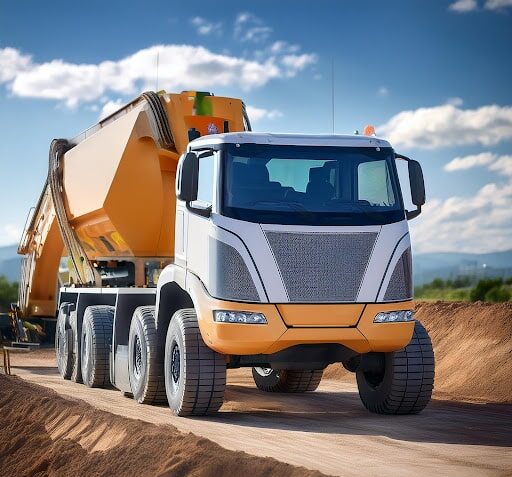The Role of Bluetooth and LoRa in Modern Asset Tracking Systems
The real-time asset tracking has become essential for businesses in industries such as construction, logistics, healthcare, and hospitality. Companies rely on asset tracking systems to ensure that valuable equipment, tools, and materials are where they need to be at all times. To achieve this, modern asset tracking platforms are integrating Bluetooth and LoRa (Long Range) technologies, which offer flexibility, scalability, and cost-effectiveness. Dalos, a leader in IoT-powered asset intelligence, leverages both Bluetooth and LoRa to provide real-time tracking and monitoring solutions tailored to modern industries. In this article, we’ll explore how Bluetooth and LoRa work, their unique benefits, and how Dalos combines these technologies to offer a comprehensive asset tracking solution. What is Bluetooth Technology? Bluetooth is a short-range wireless communication technology that allows devices to exchange data over short distances. Originally developed for personal devices, Bluetooth technology has evolved with Bluetooth Low Energy (BLE), optimized for minimal power consumption while maintaining reliable communication. BLE is ideal for asset tracking, as it allows long-term deployment of low-power devices, making it perfect for applications where low maintenance is crucial. What is LoRa Technology? LoRa (Long Range) is a wireless communication technology designed for long-distance, low-power data transmission. Operating in the sub-gigahertz frequency range, LoRa is known for its ability to provide reliable connectivity over distances of up to 10 kilometers, or more in rural areas. LoRa’s excellent coverage, low energy consumption, and ability to penetrate obstacles like buildings make it ideal for IoT applications in asset tracking. How Dalos Leverages Bluetooth and LoRa for Asset Tracking Dalos combines the strengths of both Bluetooth and LoRa technologies to create a flexible and scalable asset tracking platform that offers real-time visibility into asset location, status, and usage. Here’s how these technologies work together to deliver seamless tracking: 1. Bluetooth for Short-Range, High-Precision Tracking Bluetooth is ideal for tracking assets within smaller, defined areas, such as warehouses, construction sites, or hotel facilities. Dalos uses Bluetooth Low Energy (BLE) technology to track assets with high accuracy. BLE tags attached to equipment transmit signals to nearby receivers, which then relay the asset’s location to the Dalos platform. Key Benefits of Bluetooth for Asset Tracking: 2. LoRa for Long-Range, Low-Power Tracking While Bluetooth is effective for short-range tracking, LoRa excels in situations where assets need to be tracked over long distances, such as across construction sites, rural areas, or during transportation. Dalos uses LoRa to track assets in real time, even when they are miles away from the nearest receiver. LoRa’s low power consumption allows devices to operate for years on a single battery. Key Benefits of LoRa for Asset Tracking: 3. Combining Bluetooth and LoRa for Comprehensive Asset Tracking Dalos integrates both Bluetooth and LoRa into its platform to provide businesses with a comprehensive solution. By combining the short-range precision of Bluetooth with the long-range capabilities of LoRa, Dalos ensures that assets can be tracked efficiently, whether they are indoors, outdoors, or in transit. How Dalos Combines Bluetooth and LoRa: The Applications of Bluetooth and LoRa in Asset Tracking Dalos’ integration of Bluetooth and LoRa technologies is used across various industries to improve efficiency, security, and cost-effectiveness. Here are a few examples of how these technologies are applied in real-world settings: 1. Construction In large construction projects, equipment, tools, and materials must be tracked across vast sites to prevent loss, theft, and misplacement. Dalos uses Bluetooth to monitor assets in storage zones and LoRa to track equipment across the site, ensuring full visibility of assets. Benefits: 2. Logistics and Transportation Logistics companies track shipping containers, vehicles, and cargo as they move through the supply chain. Dalos uses Bluetooth to monitor assets in warehouses and distribution centers, while LoRa tracks them across long distances during transportation. Benefits: 3. Hospitality Hotels and resorts must track a variety of assets, including audiovisual equipment and housekeeping tools. Dalos uses Bluetooth to track assets within buildings and LoRa to monitor assets between different facilities on larger properties. Benefits: The Solution for Asset Tracking with Bluetooth and LoRa Dalos offers a flexible, scalable, and cost-effective asset tracking solution by leveraging Bluetooth and LoRa technologies. Whether your business operates in confined spaces or across multiple locations, Dalos provides real-time visibility into assets, ensuring full control over resources. Dalos’ Key Features for Asset Tracking The Bluetooth & LoRa-Enabled Platform for Asset Tracking As businesses continue to adopt IoT technology to improve efficiency and reduce costs, Bluetooth and LoRa are becoming critical components of modern asset tracking systems. Dalos leads this transformation, offering a platform that integrates both technologies to provide real-time asset monitoring across industries. Whether you need to track equipment within a building or monitor assets across long distances, Dalos’ Bluetooth and LoRa-enabled platform ensures the visibility and control necessary for efficient operations.
How to Reduce Equipment Downtime: A Guide for Project Managers

In the construction industry, reducing equipment downtime is one of the leading strategies to combat project delays, increased costs, and inefficiencies. From unexpected breakdowns to poorly tracked machinery, managing equipment effectively is crucial for keeping construction projects on schedule and within budget. Reducing equipment downtime keeps crews active, tasks smooth, and costs controlled, ensuring better project performance. For construction project managers, minimizing equipment downtime is a top priority. This is where Dalos, an IoT-powered asset intelligence platform, comes into play. Dalos reduces downtime for construction managers with real-time tracking, predictive maintenance, and performance monitoring. In this guide, we will explore how Dalos helps construction managers streamline equipment management, prevent delays, and optimize project timelines. The Impact of Equipment Downtime on Construction Projects In construction, small machinery delays can ripple, halting work and causing missed deadlines. Equipment downtime can result from a variety of factors, including: Downtime challenges increase costs from idle workers and missed deadlines. They also reduce project profitability. Construction managers need real-time visibility into equipment status. Dalos provides a game-changing solution for this visibility. How Dalos Reduces Equipment Downtime for Construction Projects Dalos’ IoT platform gives real-time visibility, predictive maintenance, and insights, reducing equipment downtime efficiently. Here’s how Dalos helps construction project managers take control of their assets and in reducing equipment downtime. 1. Real-Time Equipment Tracking and Monitoring One of the most significant contributors to equipment downtime is poor asset tracking. When equipment is misplaced or unavailable, it creates delays that can disrupt the entire project. Dalos solves this problem with real-time GPS tracking, giving construction managers complete visibility into the location of all their equipment—whether it’s heavy machinery like cranes and excavators or smaller tools like generators and compressors. How Real-Time Tracking Reduces Downtime: 2. Predictive Maintenance to Prevent Breakdowns Unplanned equipment breakdowns are a major cause of downtime in construction projects. Without proper monitoring, machines can fail unexpectedly, leading to costly delays while repairs are made. Dalos’ predictive maintenance capabilities help prevent this by continuously monitoring the performance and condition of machinery using IoT sensors. Sensors monitor engine hours, fuel use, temperature, and vibration, offering real-time equipment health data. This allows Dalos to predict when maintenance is needed, helping construction managers schedule repairs before breakdowns occur. How Predictive Maintenance Helps In Reducing Equipment Downtime: 3. Automated Maintenance Alerts and Scheduling Construction managers often miss maintenance schedules, causing service delays and increased equipment downtime. Dalos simplifies this process by providing automated maintenance alerts based on real-time usage data. Instead of relying on fixed schedules, Dalos uses equipment performance data to schedule maintenance, ensuring timely machine servicing. How This Improves Equipment Uptime: 4. Optimizing Equipment Utilization Across Job Sites Inefficient equipment utilization can also lead to downtime. When machinery is underutilized, it sits idle, delaying projects due to resource shortages. Dalos gives managers detailed usage reports for each equipment piece. This helps identify underutilized assets and redistribute resources efficiently. How Dalos Optimizes Equipment Utilization: 5. Data-Driven Decision Making for Equipment Management Dalos empowers construction managers with data-driven insights that enable better decision-making around equipment management. The platform generates performance data, usage patterns, and maintenance history for each piece of equipment, helping managers make informed decisions about which assets to prioritize for maintenance, repairs, or replacement. How Data-Driven Insights Help In Reducing Equipment Downtime:
How Logistics Leaders Can Use Dalos to Streamline Operations and Drive Growth

In today’s fast-paced logistics industry, success hinges on efficiency, visibility, and the ability to consistently meet customer expectations. Managing large fleets of vehicles, warehouses, and assets across multiple locations requires real-time data, seamless coordination, and strategic decision-making. Delays, asset downtime, and inefficiencies can quickly disrupt operations, increase costs, and damage customer relationships. Asset intelligence platforms, powered by IoT technology, offer logistics leaders the tools they need to streamline operations and drive business growth. Dalos, a leading IoT-powered asset intelligence platform, revolutionizes logistics with real-time visibility and data-driven insights. This article explores how logistics leaders can leverage asset intelligence platforms like Dalos to enhance performance and accelerate growth. The Key Challenges in Logistics Operations Logistics companies face a variety of challenges when managing assets across distributed networks, including: How Dalos Helps Logistics Leaders Drive Growth Dalos leverages IoT technology to provide logistics companies with real-time insights into the location, condition, and performance of their assets. This enables smarter decision-making, optimized operations, and business growth. Here’s how Dalos helps logistics leaders streamline operations and increase profitability: 1. Real-Time Visibility into Asset Location and Status For logistics leaders, real-time visibility is key to ensuring smooth operations. Dalos uses IoT-enabled GPS tracking to monitor the location of vehicles, shipping containers, and other critical assets as they move through the supply chain. Logistics managers can track shipments in real-time to ensure timely and accurate delivery. How This Improves Efficiency: 2. Reducing Downtime with Predictive Maintenance Asset downtime disrupts logistics operations, leading to delayed deliveries, lost revenue, and dissatisfied customers. Dalos helps minimize downtime by using IoT sensors to monitor the health and performance of vehicles and equipment. Thus, by tracking performance metrics such as engine hours, fuel consumption, and temperature, Dalos enables predictive maintenance that anticipates issues before they lead to breakdowns. How This Reduces Downtime: 3. Optimizing Resource Allocation for Maximum Efficiency Logistics leaders face the challenge of ensuring all assets—vehicles, containers, and equipment—are used efficiently. Dalos provides detailed usage reports showing how often assets are in use and whether they are fully utilized. This data allows managers to optimize resource allocation, ensuring underutilized assets are redeployed where needed most. How This Increases Operational Efficiency: 4. Enhancing Operational Decision-Making with Data-Driven Insights Data is a powerful tool for logistics companies seeking to improve performance. Dalos provides real-time data and analytics on asset performance, usage, and location, giving managers insights to make smarter decisions. Whether adjusting delivery routes or planning equipment purchases, Dalos helps logistics leaders make data-driven decisions that reduce costs and improve efficiency. How This Improves Decision-Making: 5. Supporting Business Growth through Scalable Asset Intelligence Platforms As logistics companies grow, managing assets across multiple locations becomes more complex. Dalos offers scalable solutions that grow with your business, providing a flexible platform to accommodate more assets, locations, and users. Thus, whether expanding into new markets or increasing your fleet size, Dalos delivers the scalability to support growth. How This Drives Growth:
How IoT Platforms Like Dalos are Revolutionizing Construction

The construction industry is undergoing a digital transformation, driven by Industry 4.0 technologies like the Internet of Things (IoT). This shift is redefining how construction companies manage their assets, enhancing operational efficiency while addressing the growing complexity of modern projects. IoT platforms like Dalos are at the forefront of this revolution, providing construction companies with the tools to implement smart asset management systems that boost productivity, cut costs, and open new revenue streams. In this article, we’ll explore how Dalos leverages IoT to build the future of smart asset management, its role in Industry 4.0, and why investors should pay close attention to this emerging technology. The Growing Need for Smart Asset Management in Construction The construction industry faces numerous challenges when managing resources across large, distributed job sites. From heavy machinery and tools to materials and personnel, construction companies must balance tight project timelines with the need for efficient resource utilization. Traditional asset management methods, which rely on manual tracking and paper-based records, are no longer effective in today’s highly competitive, digitized environment. The need for real-time visibility into asset location, condition, and usage has never been greater. Without it, companies risk asset misplacement, theft, and downtime, all of which lead to costly delays and budget overruns. IoT platforms like Dalos offer a comprehensive solution by enabling companies to track assets in real time and make data-driven decisions that optimize project outcomes. How Dalos Leverages IoT for Smart Asset Management Dalos is an IoT-powered asset intelligence platform that transforms how construction companies monitor and manage their equipment and resources. By integrating IoT sensors, GPS tracking, and data analytics, Dalos provides real-time visibility into asset performance, helping companies create smarter, more efficient workflows. Here’s how Dalos is revolutionizing smart asset management in the construction industry: 1. Real-Time Asset Tracking Across Distributed Job Sites In large construction projects, assets are constantly moving between various locations and job sites. With traditional methods, equipment and materials can easily get misplaced, leading to project delays and higher costs. Dalos addresses this issue by providing real-time asset tracking through GPS-enabled IoT devices attached to every piece of equipment. How This Builds the Future of Asset Management: 2. Predictive Maintenance to Minimize Downtime Equipment downtime is a leading cause of cost overruns in construction projects. Sudden equipment failures can halt progress, delay timelines, and drive up labor costs. Dalos leverages IoT sensors to monitor the health and performance of machinery in real time, tracking key metrics like engine hours, fuel consumption, and temperature. How Predictive Maintenance Builds Smarter Construction: 3. Theft Prevention with IoT-Based Security Construction sites are vulnerable to theft, especially when high-value equipment is left unattended. Dalos helps prevent theft by using geofencing technology to create virtual boundaries around job sites. Unauthorized equipment movement triggers an alert, enabling construction managers to respond swiftly. How This Protects Construction Investments: 4. Data-Driven Decision Making for Increased Efficiency In Industry 4.0, data is the key to smarter construction workflows. Dalos provides detailed reports on equipment usage, performance, and location, delivering key insights across projects. This data enables construction companies to identify inefficiencies, reallocate resources, and optimize workflows for maximum productivity. How Data Drives the Future of Construction: Dalos in the Context of Industry 4.0: Why Investors Should Take Notice Industry 4.0 is transforming the construction sector by integrating advanced digital technologies like IoT, artificial intelligence (AI), and data analytics into traditional workflows. As part of this transformation, smart asset management systems like Dalos are becoming indispensable tools for construction companies seeking to stay competitive. Here’s why investors should take notice of Dalos’ role in Industry 4.0: 1. Scalable, IoT-Driven Business Model Dalos operates on a scalable, IoT-driven business model that grows with the companies it serves. As construction firms expand their operations, the need for smart asset management increases. Dalos’ platform scales seamlessly to accommodate more assets, job sites, and users, making it an attractive investment in a high-growth market. Investor Takeaway: 2. Addressing the $10 Trillion Construction Industry The construction industry is a global market projected to reach $10 trillion by 2025. As companies increasingly adopt digital technologies to improve efficiency and reduce costs, platforms like Dalos are positioned to capture a significant share of this market. Investor Takeaway: 3. Building the Future of Sustainable Construction Sustainability is becoming a priority in construction as companies look to reduce waste, minimize environmental impact, and improve resource efficiency. Dalos enables companies to optimize material use, reduce energy consumption, and extend equipment lifespans, contributing to more sustainable construction practices. Investor Takeaway: Dalos at the Forefront of the Smart Construction Revolution IoT platforms like Dalos drive smarter, more efficient asset management as the construction industry embraces digital transformation. Dalos offers real-time visibility, predictive maintenance, and data insights to boost efficiency, cut costs, and enhance security. Invest in Dalos for scalable solutions, high growth potential, and alignment with Industry 4.0 and sustainability goals. The future of construction is smart, and Dalos is leading the charge.
Unlocking New Revenue Streams with Asset Intelligence Platforms

Dalos – The Asset Intelligence Platform to Unlock New Revenue In today’s rapidly evolving business environment, staying competitive requires more than operational efficiency. the challenge for CEOs and senior leaders, is to unlock new revenue streams while driving innovation and maximizing resource value. Asset intelligence platforms, powered by IoT technology, are revolutionizing how companies manage physical assets, offering real-time data on usage, location, and condition. These platforms empower senior management to optimize operations, reduce costs, and uncover new revenue opportunities. Dalos, a leader in asset intelligence, offers businesses the tools they need to manage assets efficiently, make data-driven decisions, and create additional value. This guide explores how CEOs can leverage platforms like Dalos to unlock new revenue streams and position their companies for long-term success. Why Asset Intelligence Matters for CEOs At its core, asset intelligence refers to the ability to monitor, track, and optimize physical assets through IoT technology and data analytics. These assets can include heavy machinery in construction, vehicles in logistics, or specialized equipment in manufacturing. Asset intelligence platforms provide valuable insights into asset performance, utilization, and how they can be monetized to generate new revenue. Key reasons why asset intelligence matters to CEOs: 1. Maximizing Asset Utilization to Generate Revenue One way CEOs can unlock new revenue streams is by maximizing the utilization of existing assets. Asset intelligence platforms like Dalos provide real-time insights into asset usage, helping companies identify underutilized equipment and reallocate resources more effectively. For example, a logistics company using Dalos can track how often its vehicles are in use versus how long they sit idle. By identifying underutilized vehicles, the company can either redeploy them to high-demand routes or rent them out to third parties, creating a new source of income. Key Benefits for Senior Management: 2. Enabling New Service Offerings Asset intelligence platforms also empower companies to create new service offerings that generate recurring revenue. By tracking the real-time condition and performance of assets, businesses can offer predictive maintenance services to clients. This ensures that equipment remains operational while generating additional revenue through maintenance contracts. Case Example:A manufacturing company using Dalos to monitor its production equipment can offer predictive maintenance services to clients. The company can notify clients when maintenance is required before a breakdown occurs, reducing downtime for clients while generating revenue from service contracts. Key Benefits for Senior Management: 3. Monetizing Data Insights A key asset of intelligence platforms is the data they generate. CEOs can leverage this data to create entirely new business models focused on monetizing insights. Companies can analyze data on asset usage across multiple sites or clients and offer customized reports or optimization recommendations as a paid service. Case Example:A construction company using Dalos to track its fleet of machinery can aggregate usage data to identify trends and inefficiencies. The company can offer consulting services to other firms, providing data-driven insights to optimize equipment usage, improve project timelines, and reduce costs. Key Benefits for Senior Management: 4. Reducing Downtime and Improving Operational Continuity Asset downtime is a major cost driver in industries where equipment is critical, such as construction, manufacturing, and logistics. Dalos uses IoT sensors to monitor the health and condition of assets in real time, allowing businesses to schedule proactive maintenance instead of reactive repairs. By reducing downtime, businesses cut maintenance costs, keep projects on schedule, and maintain high productivity. For CEOs, this leads to higher profitability and the ability to reinvest cost savings into other growth areas. Key Benefits for Senior Management: 5. Enabling Scalability Through IoT Integration As businesses grow, so does the need for robust asset management systems. Platforms like Dalos are designed to scale alongside business operations, enabling CEOs to manage more assets without significantly increasing costs. Whether expanding geographically, increasing fleet size, or diversifying services, Dalos’ platform scales to meet these demands. For CEOs, this scalability is critical when entering new markets or expanding the company’s reach, ensuring that operations remain efficient and profitable as the company grows. Key Benefits for Senior Management:
Why Logistics Companies Need IoT-Based Monitoring Solutions

Dalos: Iot-Based Monitoring Solution for Logistics Companies In fast-paced logistics, real-time asset visibility ensures timely, undamaged, and disruption-free delivery of goods. Whether transporting raw materials, finished products, or critical supplies, managing assets in transit is a high-stakes challenge. To address these challenges, more logistics companies are turning to Internet of Things (IoT)-based monitoring solutions like Dalos. These solutions provide real-time data on location, condition, and transit status, enabling logistics managers to streamline operations, improve decision-making, and mitigate risks. In this article, we’ll explore why IoT-based asset monitoring is crucial for logistics companies and how Dalos is transforming the industry with real-time visibility solutions. The Challenges of Asset Management in Logistics The logistics sector is responsible for managing the movement of goods across vast distances, often involving multiple transportation methods, border crossings, and supply chain handoffs. With so many moving parts, logistics companies face several challenges when managing assets in transit: The Importance of Real-Time Visibility with IoT-Based Solutions IoT-based monitoring solutions like Dalos provide logistics companies with the real-time visibility they need to overcome these challenges and improve their operations. By integrating IoT sensors, GPS tracking, and data analytics, Dalos offers real-time updates on location, condition, and status of assets in transit. Here’s how real-time asset visibility transforms logistics operations: 1. Tracking Assets in Real Time for Improved Delivery Accuracy One of the biggest advantages of IoT-based monitoring solutions is the ability to track assets in real time. GPS-enabled IoT devices offer real-time location updates, letting logistics managers track shipments throughout the supply chain. How This Improves Delivery Accuracy: 2. Preventing Asset Loss and Theft Asset loss and theft are significant risks in logistics, especially when transporting high-value goods over long distances or across borders. IoT-based monitoring solutions like Dalos help mitigate these risks by providing continuous tracking and real-time alerts. This solution is crucial when assets deviate from their expected routes or enter unauthorized areas. How This Prevents Loss and Theft: 3. Monitoring Asset Conditions in Transit IoT sensors monitor asset conditions in transit, safeguarding temperature or humidity-sensitive goods. Dalos provides real-time monitoring for logistics to ensure goods arrive in optimal condition. How This Ensures Asset Integrity: 4. Optimizing Supply Chain Efficiency IoT-based monitoring solutions also provide valuable data to help logistics companies optimize their supply chain efficiency. Real-time data on asset movement, route performance, and delivery timelines allows businesses to identify bottlenecks, optimize routing, and improve overall operations. How This Optimizes Supply Chains: 5. Reducing Operational Costs and Improving ROI IoT-based monitoring solutions offer significant cost-saving benefits. By reducing asset loss, preventing damage, and optimizing efficiency, logistics companies can lower operational costs and improve return on investment (ROI). Key Cost-Saving Benefits:
How Asset Lifecycle Optimization In Hospitality Can Reduce Costs

Asset lifecycle optimization in hospitality is critical to maintaining smooth operations, delivering exceptional guest experiences, and controlling costs. Hotels rely on high-end kitchen equipment, HVAC systems, furniture, and linens. These assets need tracking, maintenance, and timely replacement. Poor asset management can lead to increased costs from premature replacements, unexpected breakdowns, and inefficient use of resources. Dalos is an IoT-powered asset intelligence platform. It helps hotels and resorts optimize the lifecycles of their assets through better management practices. This ensures that equipment and resources are used efficiently, maintained regularly, and replaced at the right time. By optimizing the lifecycle of critical assets, Dalos helps hospitality businesses reduce operational costs. It also improves service quality and extends the longevity of their investments. In this article, we’ll explore how asset lifecycle optimization can benefit the hospitality industry and how Dalos simplifies this process. The Importance of Asset Lifecycle Management in Hospitality In a hotel or resort, assets range from essential operational equipment, such as HVAC systems, elevators, and kitchen appliances. They also include guest-facing items, such as bedding, furniture, and technology systems. Each of these assets has a specific lifecycle—from acquisition and usage to maintenance and eventual replacement. When assets are not managed effectively, it can lead to: To avoid these pitfalls, hospitality businesses must adopt a lifecycle management approach that tracks asset performance from acquisition to disposal. By doing this, a business ensures that each asset is used to its fullest potential while minimizing costs. How Dalos Optimizes Asset Lifecycles in the Hospitality Industry Dalos provides a comprehensive solution for asset lifecycle management in hospitality by offering real-time tracking and predictive maintenance. Furthermore, it provides data-driven insights that help hotels and resorts manage their assets more effectively. Here’s how Dalos helps hospitality businesses optimize their asset lifecycles, reduce costs, and improve service quality: 1. Real-Time Asset Monitoring for Better Resource Utilization Dalos uses IoT-enabled sensors to provide hotels and resorts with real-time visibility into the location, condition, and usage of their assets. Whether it’s a kitchen appliance, HVAC unit, or piece of guest furniture, Dalos tracks each asset’s performance in real-time, helping businesses understand how resources are being used. How This Optimizes Asset Lifecycles: 2. Predictive Maintenance to Minimize Downtime and Repair Costs Dalos addresses asset downtime by utilizing predictive maintenance capabilities. Furthermore, it leverages IoT sensor data to monitor asset health and predict maintenance needs before failures occur. How Predictive Maintenance Optimizes Lifecycles: 3. Automated Maintenance Scheduling to Keep Assets in Optimal Condition Hospitality managers can find manually tracking maintenance schedules for hundreds (or even thousands) of assets challenging. Dalos simplifies this process by providing automated maintenance scheduling, based on the real-time performance of each asset. How Automated Scheduling Reduces Costs: 4. Optimizing Replacement Decisions with Data-Driven Insights Dalos provides data-driven insights that help hospitality managers make informed decisions about when to replace assets, ensuring that replacements are timed perfectly to maximize value. How Data-Driven Insights Help with Lifecycle Management: Improving Guest Satisfaction Through Seamless Operations In the hospitality industry, guest satisfaction is paramount. Equipment failures can lead to disruptions in service, negative reviews, and a loss of business. By optimizing the lifecycle of critical assets, Dalos ensures seamless operations and enhanced guest experiences. Asset Lifecycle Optimization In Hospitality Can Reduce Costs Effective asset lifecycle management in hospitality is essential to controlling costs, maintaining high service standards, and ensuring operational efficiency. Dalos’ Unified Asset Intelligence Platform provides hospitality businesses with the tools they need to optimize the lifecycles of their assets, reduce costs through better maintenance practices, and improve service quality. By implementing Dalos, hospitality leaders can extend the lifespan of their assets, reduce repair and replacement costs, and deliver an exceptional guest experience—ultimately driving profitability and long-term success in a competitive industry.
IoT Asset Management Platforms – The Future of Recurring Revenue

IoT is revolutionizing logistics, construction, healthcare, and hospitality by transforming business operations management. IoT-based asset management platforms offer real-time insights, predictive maintenance, and optimized operational efficiency. These platforms are not only reshaping company operations but are also becoming significant drivers of recurring revenue. For investors, platforms like Dalos present a highly attractive opportunity, offering stable, subscription-based revenue models that generate long-term profitability. In this article, we’ll dive into why IoT asset management platforms are poised to dominate the future of recurring revenue, how Dalos operates within this space, and why investors should pay attention to this fast-growing market. The IoT Revolution and the Shift to Recurring Revenue As industries become more digitized, the adoption of IoT technology is skyrocketing. Companies use IoT solutions to monitor, track, and optimize performance of vehicles, machinery, and equipment.Real-time monitoring and predictive analytics are shifting businesses from one-time purchases to subscription-based services. Recurring revenue models are gaining popularity in the IoT landscape for several key reasons: Investors favor recurring revenue models for stability over sales-driven businesses with fluctuating demand and short sales cycles. How Dalos Drives Recurring Revenue with IoT Asset Management Dalos, an IoT-powered asset intelligence platform, exemplifies the recurring revenue model by offering businesses real-time tracking, predictive maintenance, and operational insights through a subscription-based service. Here’s how Dalos generates stable, recurring revenue streams: 1. Subscription-Based Pricing for Asset Management Dalos operates on a subscription-based pricing model, where businesses pay a monthly or annual fee to access the platform and manage their assets. The subscription cost is typically based on the number of assets tracked and monitored, allowing companies to scale their service as their operations grow. Why This Drives Recurring Revenue: 2. Ongoing Service Contracts for Predictive Maintenance Beyond asset tracking, Dalos offers predictive maintenance services via IoT sensors that monitor equipment condition and performance in real time. By detecting potential issues before they cause breakdowns, Dalos helps companies reduce downtime, lower maintenance costs, and extend the lifespan of their assets. These ongoing service contracts generate additional revenue as businesses pay for continuous monitoring and maintenance alerts. Why This Benefits Investors: 3. High Customer Retention Through Value-Added Services Dalos’ asset intelligence platform provides real-time data, predictive insights, and automated alerts that are crucial for business operations. Once companies implement Dalos, they become highly dependent on it for managing assets and monitoring performance. How This Drives Long-Term Revenue: 4. Scalability and Growth Potential in Emerging Markets The global IoT market is growing rapidly, with businesses across industries adopting IoT platforms to improve efficiency and reduce costs. As this trend grows, demand for IoT asset management like Dalos rises, offering growth opportunities for scalable companies. Why Investors Should Take Notice: 5. Recurring Revenue Through Industry-Specific Solutions Dalos’ flexibility allows it to offer tailored solutions to various industries, from logistics and construction to hospitality and healthcare. Each sector faces specific asset management challenges, and Dalos adapts its services accordingly, expanding its reach across multiple sectors. Why This Drives Long-Term Growth:
Top 10 Ways Hotel Asset Tracking Drives Operational Excellence
Explore 10 smart ways asset tracking boosts hotel efficiency, reduces costs, and improves guest experience through real-time monitoring and automation.